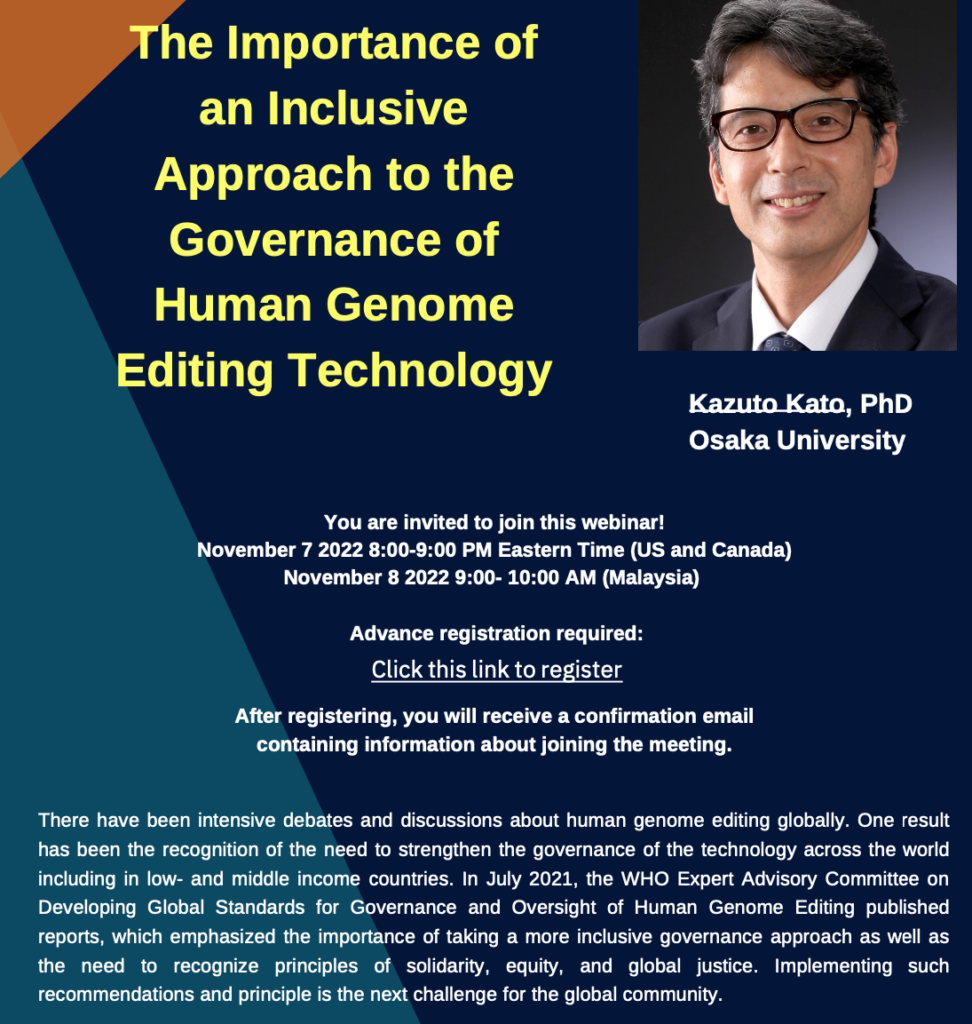Hot Topics in Research Ethics: The Importance of an Inclusive Approach to the Governance of Human Genome Editing Technology
You are invited to join this webinar!
Click this link to register
After registering, you will receive a confirmation email containing information about joining the meeting.
There have been intensive debates and discussions about human genome editing globally. One result has been the recognition of the need to strengthen the governance of the technology across the world including in low- and middle income countries. In July 2021, the WHO Expert Advisory Committee on Developing Global Standards for Governance and Oversight of Human Genome Editing published reports, which emphasized the importance of taking a more inclusive governance approach as well as the need to recognize principles of solidarity, equity, and global justice. Implementing such recommendations and principle is the next challenge for the global community.
Kazuto Kato, PhD is Professor of Biomedical Ethics and Public Policy at the Graduate School of Medicine, Osaka University, Japan. He has a PhD degree in developmental biology from Kyoto University. After finishing postdoctoral research at the University of Cambridge with Sir John Gurdon, he started to work in the interface between bioscience and society, particularly focusing on ethical and social issues of genomics and stem cell research. He was an associate professor at the Institute for Research in Humanities at Kyoto University before taking up the current position.
He has served as a member of various international projects/academic societies such as Ethics Committee of Human Genome Organization (HUGO), ELSI group of the International HapMap Project, Ethics and Policy Committee of the ICGC (International Cancer Genome Consortium) and Ethics and Public Policy Committee of the ISSCR (International Society for Stem Cell Research). In 2010, he was appointed as a member of the Expert Panel on Bioethics of the Council for Science and Technology Policy (CSTP) of the Cabinet Office, Japan. In 2013, Professor Kato was also appointed as the chairperson of Research Ethics Committee, RIKEN Center for Developmental Biology (CDB). Professor Kato is currently specializing in biomedical ethics, science communication and public policy of life sciences.
Since 2010 Professor Kato has been directing a new research group, the Research Unit for the ELSI of Genomics to carry out analysis of ethical, legal and social implications of human genome research, particularly focusing on the whole genome and exome analysis. The Research Unit actively collaborates with leading genomics researchers as well as ELSI scholars in Japan and other countries including those in Asia.
This programme is organised by the Master of Health Research Ethics (MOHRE) programme at Universiti Malaya (http://www.mohre.um.edu.my). It is supported by the Fogarty International Center of the United States, National Institutes of Health (Grant R25TW010891) in collaboration with the Berman Institute of Bioethics, Johns Hopkins University.
